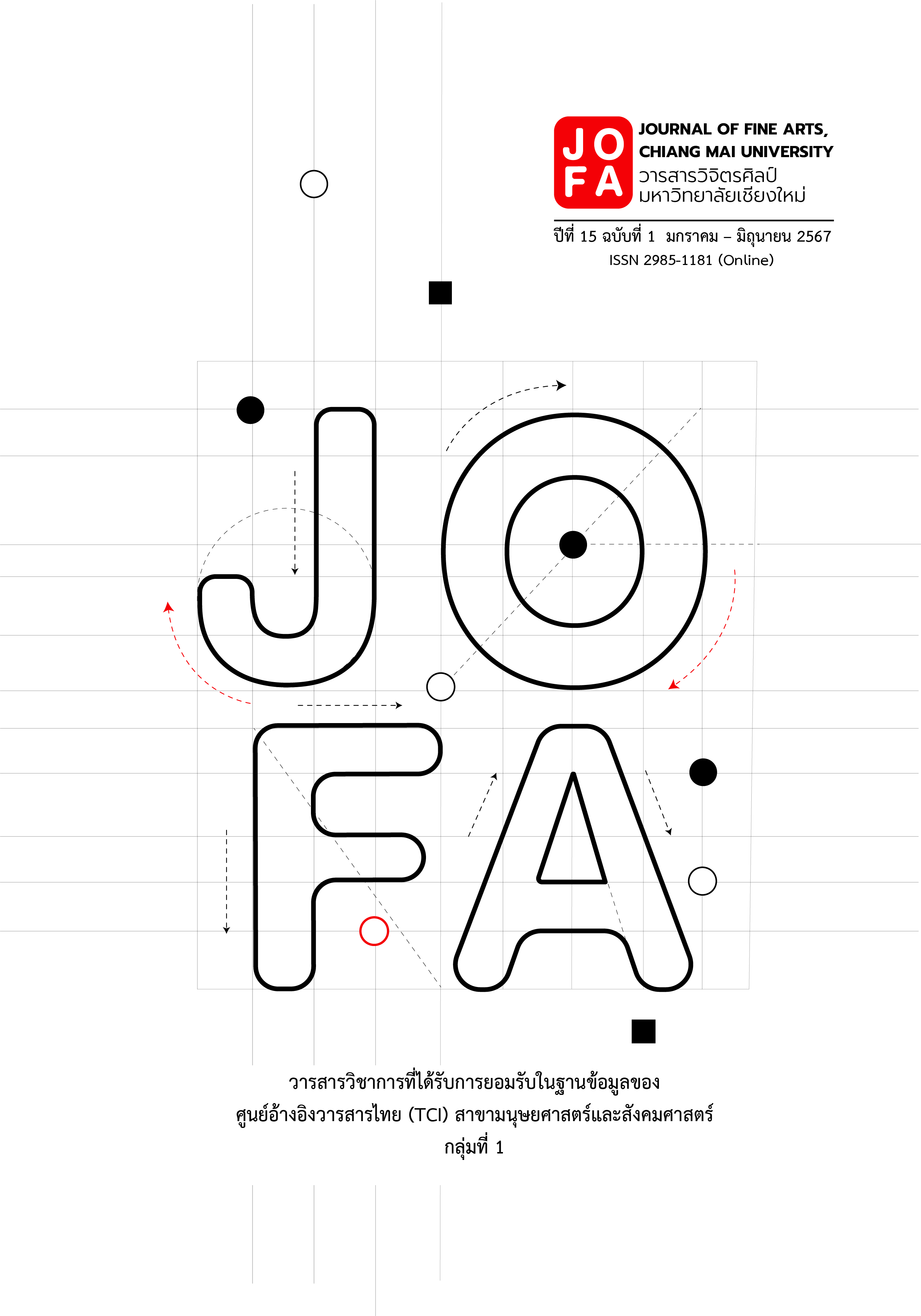Creating a Sustainable Fashion Lifestyle Product Identity with a Cross - Cultural Design Concept
Main Article Content
Abstract
This research used a mixed approach including qualitative, quantitative and fashion lifestyle product design. The objective of the research is to find the sustainable fashion lifestyle product identity development guideline with cross cultural design concept using Thai-Lue cultural textile capital in Nan province towards international market. The research process consisted of 1) collecting qualitative data on fashion product consumption, environmental-friendly fashion products, and culturally relevant fashion products from experts with Delphi technique. The data is analyzed using the paper doll data set technique to obtain the most suitable fashion design elements for the target consumers. 2) Quantitative data collection using an online questionnaire on the 200 generation Y population in Bangkok city, aged 22-42 years. The data is then analysed in terms of general consumption, lifestyle, fashion product consumption, eco-friendly fashion product consumption, culture-related fashion products. The study found that a sustainable fashion lifestyle product identity with a cross-cultural design concept for the international market includes 5 components: 1) textile innovation, 2) sustainable design innovation level, 3) target groups: fashion leader with strong environmental concern and cultural textile, fashion follower with environmental concerned and cultural textile, minimal fashion with environmental concerned and cultural textile, 4) culture, and 5) trend.
Article Details

This work is licensed under a Creative Commons Attribution-NonCommercial-NoDerivatives 4.0 International License.
References
Aroonkriengkrai, P. (2020, July 1). Anākhot Khō̜ng Kānthō̜ngthīeo Yūtrongnai Naiyuk Khōwit Sipkao [Future of Travel]. Creative Thailand. https://www.creativethailand.org/article-read?article_id=32496
Arunyanart, S. (2015). Nawattakam TrāSinkhā FǣChan Laisatai Thun Watthanatham Krung ThēP Mahā Nakhō̜N Samrap PhūBō̜RiphōK ČHēNnœ̄RēChan ʻēChīA [Innovation of Fashion Lifestyle Brand: Bangkok Cultural Capital for Generation Asia] [Ph.d. diss.]. Faculty of Fine and Applied Arts, Chulalongkorn University.
Banyte, J., Brazioniene, L. & Gadeikiene, A. (2010). Inestigation Of Green Consumer Profile : A Case Of Lithuanian Market Of Eco - Friendly Food Products. Economics And Management, 15, 374-385.
Cornell University. (n.d.). Basic, Fashion, And Fad Products. https://courses.cit.cornell.edu/cuttingedge/lifeCycle/03.htm
Kaewthong, S. (2017). PatčHai Thī Song Phon Tō̜ KhwāMtangčHai Sư̄ Sinkhā FǣChan Phư̄A KhwāMyangyư̄N [Factors Influencing Consumers’ Intention to Purchase Sustainable Fashion] [Master’s thesis], Faculty of Humanities and Social Science, Burapha University.
Kanjanawasee, S. (2001). Thit Sa Dī Kānthotsō̜p Bǣp Dang Dœ̄m [Classical test theory] (4 ed.), Bangkok: Chulalongkorn University.
Kozlowski, A., Michal B., & Cory S. (2019). Tools for Sustainable Fashion Design: An Analysis of Their Fitness For Purpose. Sustainability, 11(13), 1-19. https://www.mdpi.com/2071- 1050/11/13/3581/pdf
Lin, R. T. (2007). Transforming Taiwan Aboriginal Cultural Features Into Modern Product Design: A Case Study Of A Cross - Cultural Product Design Model. International Journal Of Design, 1(2), 45-53. http://www.ijdesign.org/index.php/IJDesign/article/view/46/26
Nan Community College. (2017). Mō̜ Ra Dok Phā Thō̜ Thai Lư̄ [Heritage of Tai Lue Textile]. Nan: Inkberry Limited Partnership.
NeSDc (Office Of The National Economic And Social Development Council). (n.d.). Yutthasāt Chāt Yīsip pī phō̜ sō̜ 2561 thưng 2580 [National Strategy 2018-2037]. https://drive.google.com/file/d/1XSBMp8OCsauJqECOB-XZLB91-cRrNsEV/view
Noithammaraj, P. (n.d.). NǣOthāNg KāN Songsœ̄M KāNthō̜NgthīEo Thī Yangyư̄N [Guidelines for promoting sustainable tourism]. DASTA Academy. https://www.thaiscp.net/upload/download/20190520152330149.pdf
Pinkaeo, K. (2011). SēTthakit SāNgsan Thun Watthanatham Læ ʻōKāT ThāNg Thurakit [Creative Economy. Cultural Capital and Business Opportunity]. The Executive Journal, 31(1), 32-37.
Tiprean, J. (2016). Phrưttikam KāN Sư̄ Khō̜Ng FāK Khō̜Ng Nakthō̜NgthīEo ChāO ČHīN BǣP ʻitsara Nai KhēT Krung ThēP Mahā Nakhō̜N [Studying The Purchase Of Souvenirs In Bangkok By Free In Dependent From China] [Master’s thesis], Faculty of Commerce and Accountancy, Thammasat University. http://ethesisarchive.library.tu.ac.th/thesis/2016/TU_2016_5802031244_5213_4101.pdf
Utiswannakul, P. (2018). FǣChan Læ Phalittaphan Laisatai [Fashion and Lifestyle Product]. Bangkok: WiSDom.
Utiswannakul, P., Jarujinda, S., Srikulkit, K. & Arunyanart, S. (2019). Kān Phœ̄m Mūn Khā Na Wat Ta Kam Sing Thō̜ Nai Pha Hō̜lit Phan Fǣ Chan Lai Sa Tai Čhāk Thān Kān Pha Hō̜lit Čhang Wat Nān Sū Ta Lāt Mư̄ang Lūang Phra Bāng [Value Added In Innovation Of Fashion Lifestyle Products From Nan Region Production Sources Towards Luang Prabang]. Bangkok: Thailand Science Research and Innovation (Tsri).


